Listen to This Article:
How do you become a chef? It’s a little more complicated than simply learning a few basic recipes, declaring yourself a “chef,” and going out to look for a job. You may be a great cook, but professionals in the food service industry make a distinction between cooks and chefs, so putting “chef” on your resume is inadvisable until you’ve truly earned the title.
How do you earn the title of “chef?” That’s what this guide is about: how to earn the title of “chef” with the broadest application across the industry.
While it’s technically possible to become a chef without formal education, it’s a myth that credentials in the restaurant and food service industry don’t matter. Nothing could be further from the truth: employees with culinary or pastry credentials differentiate themselves from their peers who do not have an education. Why? Because they’ve invested in themselves.
Critical skills for success in the industry include:
- Technical skills: Cooking methods, knife skills, seasoning, pastry techniques, plating, and flavor profiles
- Professional skills: Including “real-world” experience during an industry externship and other hands-on training in a professional kitchen
- Business skills: Understanding profit and loss, writing business plans, and managing restaurant operations
…and more.
In this complete guide, we’ll cover the steps to becoming a chef, how long it takes, how to find a job, and more. We cover all of the questions you ever thought you could ask…and then some. So let’s get started!
What Does a Chef Do?
“What does a chef do?” is a deeper question than it might seem on its surface. Put simply, chefs are professionals who make food for a living. Yet there are many different types of chefs with different responsibilities and skills. Together, they are responsible for preparing food and helping a kitchen run smoothly.
The multiple chefs and cooks in a kitchen have to be orchestrated in a way that achieves two primary and equally important objectives: 1) creating an enjoyable dining experience for restaurant patrons, and 2) ensuring that the restaurant turns a profit.
Chefs higher up in the kitchen hierarchy direct cooks and other kitchen workers to ensure quality and timeliness of meal preparation, while chefs lower in the hierarchy are more often responsible for cleaning, cutting, cooking, and plating food.
Chefs may work in a variety of places including fine-dining restaurants, event venues, and even cruise ships.
Chefs vs. Cooks: What’s the Difference?
Chefs and cooks are often confused. Both jobs revolve around food, but the roles are different.
A chef is typically a highly-skilled culinarian with years of training and experience, while a cook is someone who has been taught to complete a task but may lack the technical knowledge skills, training, and certification to be considered a chef. Some people think of working as a cook to be a job, and working as a chef to be a career, but career cooks are also common.
Another difference between the two is level of responsibility. Chefs generally manage the kitchen and the cooking, but do less of the day-to-day cooking tasks. They often oversee the preparation of food and manage different workstations, and they help keep a restaurant running by delegating tasks, ordering supplies, planning meals, and calculating costs.
Cooks, on the other hand, usually work under the direction of chefs and managers. They are often the ones preparing the food, but do not decide what to prepare or how to prepare it.
Some people use the terms “chef” and “cook” interchangeably, but chefs are generally thought to be more skilled and qualified than cooks. However, don’t overlook “cook” as a career, and be ready to learn from experienced cooks. Experienced career cooks who master a single speciality are critical to the success of every kitchen. Aspiring chefs would be wise to pay attention and learn from them.
What Is the Average Chef’s Salary?
Do chefs get paid well? The answer to this question depends on what salary you consider to be ideal. But in general, an experienced chef can make a good living.
Like any professional, the salary any individual chef earns is dependent on a number of factors including:
- Level of education
- Years of experience
- Geographic location (state and city), and
- Level of responsibility.
In 2023, the median pay for chefs was $58,920 annually, or $28.33 per hour, according to the U.S. Bureau of Labor Statistics. This salary is for those with five years or more of professional experience and at least a high school diploma or GED.
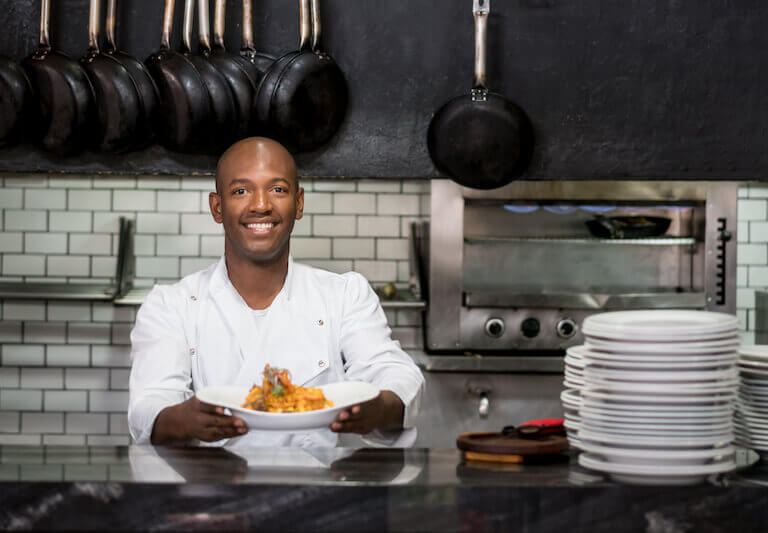
Entry-level positions offer comparatively lower wages, but your starting salary is dependent on your level of education and experience.
Every restaurant and venue pays differently, and average salaries differ from state to state. In states like New York, California, and Oregon, the cost of living is higher, so chefs are generally paid better than equal positions in other states.
As a general rule, the more prestigious the venue you work in, the better your pay. And the more responsibilities you have and the more people you oversee, the higher your compensation.
Steps to Becoming a Chef
Becoming a chef requires hard work and dedication, but unlike other careers like a doctor or lawyer, where laws and regulations are well-defined, there is no specific formula that you must follow to earn the title of “chef.” Every chef’s journey looks a little different.
With that said, those who go on to become successful chefs often take the following steps.
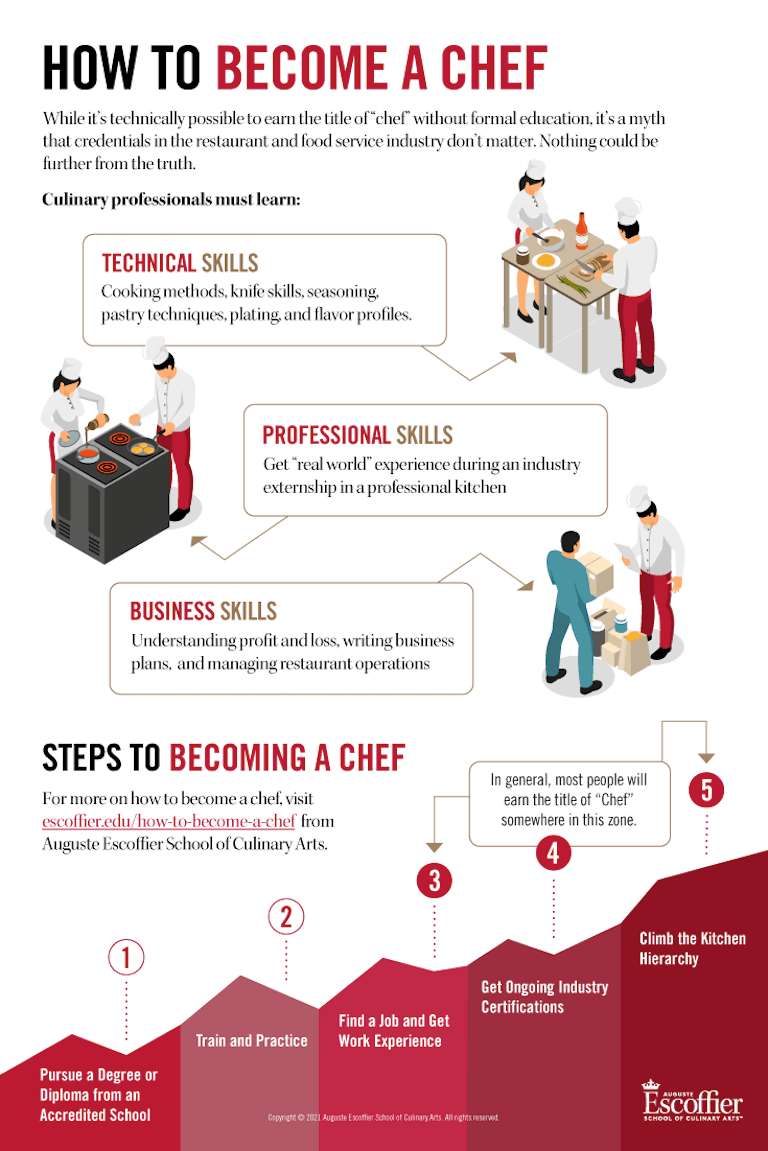
1. Pursue a Degree or Diploma from an Accredited School
While technically optional, getting a culinary degree or diploma is strongly recommended for today’s up-and-coming chefs. The restaurant industry is highly competitive, and employers prefer candidates with experience and training.
In addition to experience and training, culinary school also offers young chefs opportunities to decide what type of kitchen they see themselves in, and what kind of culinarian they’d like to be, and allows professionals to network with like-minded peers.
As the New York Times notes, “Especially for those changing careers, formal training is becoming the fastest and most efficient way into an industry that has grown in competition and complexity.”1
If you decide not to go to culinary school, becoming a chef is still possible, but securing jobs at this level versus peers who have gone to culinary school may be more challenging.
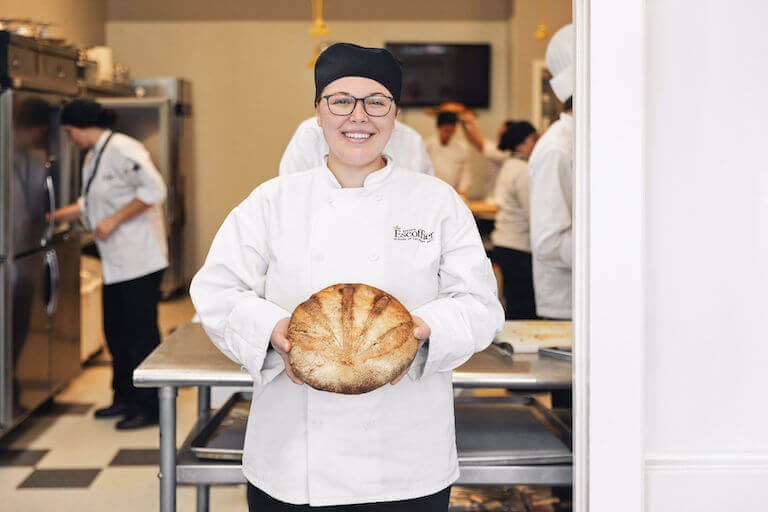
2. Train and Practice
In the culinary industry, experience is invaluable. There is nothing that prepares you more for the demands of a professional kitchen than hands-on practice.
Another reason to pursue a degree or diploma through culinary education is for the training opportunities such as externships. At Auguste Escoffier School of Culinary Arts, we help our students find six-week externships toward the end of their degree or diploma program.
Externships fill in skill gaps and give students opportunities to practice what they’ve learned in fully-functioning professional kitchens.
If you do not go to culinary school, consider completing apprenticeship programs to gain training and experience.
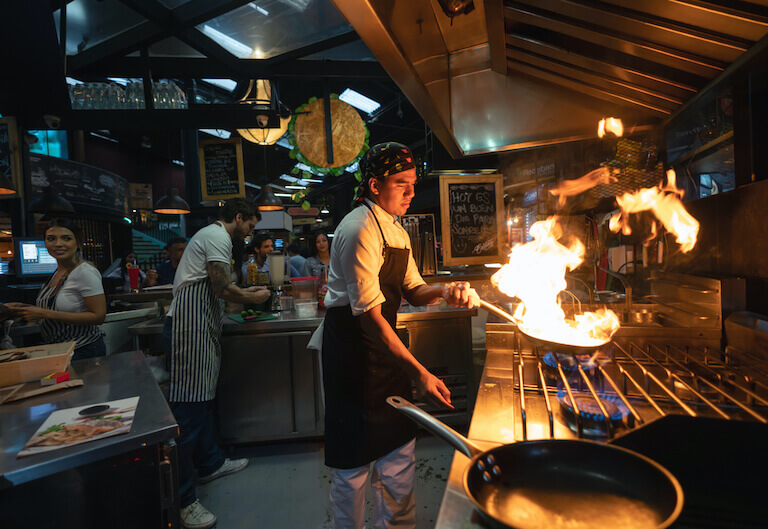
3. Find a Job and Get Work Experience
At this point, you’re well on your way to becoming a chef and can scope out restaurants you’d like to work in. If you’re open to relocating and diligent about applying to as many positions as possible, you will have an easier time finding a job.
Common entry-level positions include Line Cook, Prep Cook, and general Kitchen Staff.
Take advantage of your professional network to stay in the know about job openings in your desired area and field. More on the job search process in later sections.
4. Get Ongoing Industry Certifications
Certifications are another optional but highly recommended part of becoming a chef. If you supplement your degree and experience with certifications, you will be an even stronger candidate when you enter the workforce.
The American Culinary Federation offers many types of chef certifications. We’ll go into more depth about how (and why) to get these a little later.
You may choose to get one or two certifications before becoming a chef, but you also don’t need to get certified at all before you get your first full-time job in a kitchen. Many chefs obtain certifications later in their careers as part of their self-directed continued learning.
5. Work Your Way Up in the Kitchen Hierarchy
Your journey is far from over after you’ve secured a job. You must give an entry-level job everything you’ve got to be successful, and learn as much as you possibly can in this role. Chefs need to prove their skill after getting hired if they want to be promoted to higher positions.
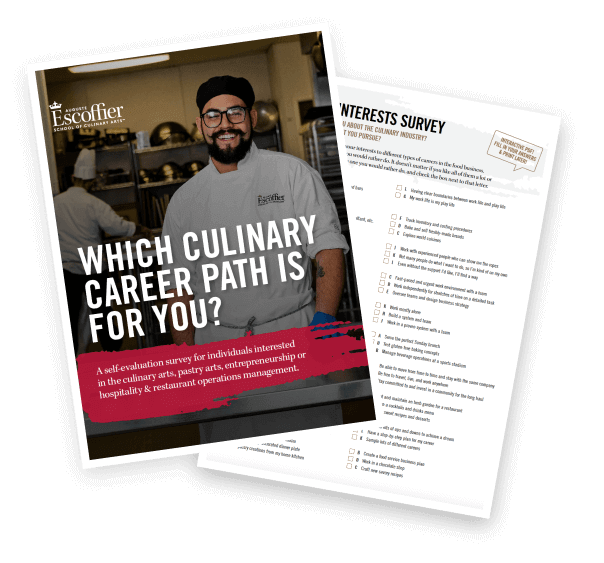
Take the Culinary Career Survey
We’ve compiled a checklist of all of the essential questions into one handy tool: career options, culinary interest surveys, educational opportunities, and more.
How Long Does It Take to Become a Chef?
How long it takes you to become a chef depends on which of the above steps you take, and how long you dedicate to each learning opportunity.
Culinary school may be the first step for you. The average person takes between one and four years to complete a program from an accredited culinary institute, which may end in a diploma, associate degree, or bachelor’s degree.
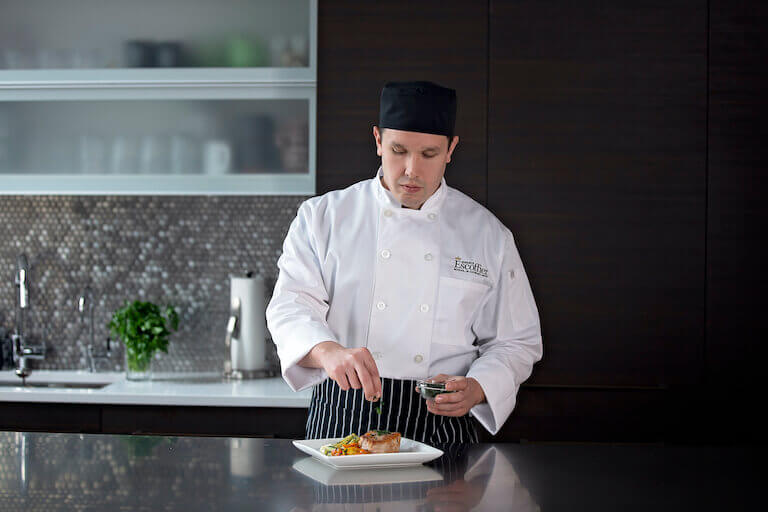
Many culinary students are employed part-time or full-time while completing their program. Some have families and other obligations outside of work and school. Some have tried traditional college and decided it wasn’t for them before enrolling in culinary school. Some culinary students are active-duty military personnel or veterans. Completing a degree or diploma program as quickly as possible or right out of high school is not necessary.
Culinary institutes often set low weekly time requirements to help students living many different lifestyles to succeed. For example, students in Escoffier’s online culinary school programs are expected to complete approximately 15-23 hours per week on school-related activities depending on program and credential in order to be successful. And if you do have a demanding schedule, great schools like Escoffier will work with you to help you fit a quality education into your life.
“We’re able to take people and give them the experience that they need in a real-world work setting. I think having the practical side mixed with the formal education is a chance to be successful. Tying all those pieces together from a passion perspective into an educational perspective, I think that’s really where the secret sauce lies.“*
Tim Condon, Executive Chef, Angry Cactus
During your education you will shadow professional chefs in operational kitchens and accrue several weeks of experiential learning. If you decide to obtain certifications, you can expect to dedicate around 30 hours of coursework to earning one.
Overall, how long it takes you to become a chef is up to you, and the opportunities that come your way. For many, this journey can span several years.
More Resources for How to Become a Chef
Take a deep dive! Here are more resources on becoming a chef.
- Why a Culinary Degree Doesn’t Automatically Make You a Chef
- What Restaurant Managers are Looking For in a Pastry Chef Hire
- Is the Long-Term Chef Shortage Over…or Just Paused?
- Which Famous Female Chefs Do Escoffier Chef Instructors Admire?
- What Does a Chef Consultant Do?
- How Long Does It Take to Become a Chef?
- 4 Traits All Restaurants Look for in Hiring New Chefs
- Why Culinary School is So Important For Networking and Career Building as a Chef
- 4 Menu Planning Tips For Young Chefs
- 5 More Ways To Manage Your Time as a Chef
- How Chefs Can Build Standout Resumes
- A Brief History Of The Chef’s Uniform
- From Education to Entrepreneur: Benefits of One-on-One Chef Mentoring
- 4 Advanced Cooking Methods for Every Chef
- 4 Non-Cooking Skills That All Chefs Need
- How New Chefs Can Stand Out in the Kitchen
What Are the Types of Chefs and Their Duties?
In every professional kitchen, many people work together to carry out tasks and get food to guests awaiting their meals. There are managerial chefs such as the Executive Chef, Sous Chef, and Senior Chef or Station Chef that oversee kitchen staff and ensure food excellence and adherence to safety requirements. Then there are specialty chefs and cooks that carry out the prepping, cooking, and cleaning.
As you work toward becoming a chef, ask yourself what type of role you see yourself in. While you may not set your sights on any single position just yet, it’s a good idea to familiarize yourself with the roles and responsibilities of chefs in professional kitchens.
Executive Chef
Executive chefs are at the top of the kitchen hierarchy, the “CEO” or Chief Executive Officer of the kitchen, so to speak. This means that they should theoretically be able to assume any role and complete any task in the kitchen. Executive Chefs delegate tasks to other employees and are responsible for managing and overseeing the entire kitchen.
It takes most people many years to make it to Executive Chef status. To become an Executive Chef, you must demonstrate not only cooking expertise, but also that you are a capable supervisor and leader. All other chefs in the kitchen count on the Executive Chef to give them direction and coaching, and the Executive Chef must also manage costs and pricing, menu and recipe development, inventory and ordering, and hiring/firing.
Ultimately, much of the fate of a restaurant is in the Executive Chef’s hands.

Sous Chef
Sous Chefs are under the direction of Executive Chefs. They act as an assistant to the Executive Chef, supporting them in whatever ways they may need. Sous Chefs often step in as shift managers to ensure that their kitchen is always fully staffed, and they commonly oversee deliveries and handle ordering. Sous Chefs may train staff members, help support stations as needed, and run quality checks.
But above all, a Sous Chef is there to assist and fill in for the Executive Chef, so they must be incredibly flexible.
Pastry Chef
Pastry Chefs are another type of Specialty Chef. When you specialize in cooking sweet dishes and baking, you are considered to be a Pastry Chef. Pastry Chefs make anything from candies to elaborate cakes, and they are in charge of imagining new menu items.

Pastry Chefs need to be specially trained in the Pastry Arts, which is entirely different from the Culinary Arts. Most culinary institutes offer both Culinary Arts and Pastry Arts degrees and diplomas.
Pastry Chefs and Executive Chefs are sometimes on the same level, especially in restaurants where dessert is as important to a menu as the main dishes. Sometimes, they may collaborate on dishes that combine sweet and savory elements. If you are passionate about baking and all things pastry and dessert, the role of Pastry Chef may be a good fit.
Chef Consultant
An alternative to cooking in a professional kitchen, Chef Consultants are called on to support restaurants and businesses in improving their food operations. A restaurant may hire a Chef Consultant to help develop a new menu, increase profits and/or efficiency, or train staff members.
In some cases, a Chef Consultant is called in to offer second opinions on why a kitchen may be experiencing problems or struggling to stay afloat. To become a Chef Consultant, you must be a skilled culinarian and be knowledgeable about Hospitality and Restaurant Operations Management.
“I’ve done everything from helping small mom-and-pop cafes get off the ground, kitchen designs, menu design, cross-utilization training, culinary training, and we’ve gone all the way up to product commercialization. For example, several products that are currently on the shelves in grocery stores and markets are ones that I’ve helped consult to get off the ground.”*
Chris McAdams, Escoffier Graduate & Chef Consultant/Research Chef
Chef Consultants are constantly moving around from place to place and must have an entrepreneurial spirit. If you enjoy fast-paced, challenging work and don’t mind being “in the thick of it,” you may be an ideal candidate for a career in chef consulting.
Personal Chef
Personal Chefs do not work for others in professional kitchens. Instead, they work in private locations and cook for multiple clients. Personal Chefs are entrepreneurs.
Personal Chefs typically provide food to multiple families. They can go to any of their clients’ homes once or a few times each week and prepare foods using the client’s kitchen space, package and store the foods, and leave reheating instructions. Or, they can prepare foods at a commissary kitchen and drop off packaged items to clients, again with instructions.
Private Chef
Private Chefs are similar to Personal Chefs, except that they work for a dedicated household. They often travel with the family from their main home to a vacation home, or even on yachts, private aircraft, and so on.
As a personal or private chef, you will be your own boss and need to have what it takes to run a business in order to succeed. These alternative career paths might be for you if you enjoy planning, cooking, providing customer service, and setting your own schedule.
Chef Owners
A Chef Owner is a chef who partially or fully owns the restaurant they work in. Not every restaurant is owned by a chef, but it is common for people with culinary backgrounds to establish their own businesses.
Chef Owners are responsible for starting up and funding a restaurant’s business operations and then managing a restaurant within and beyond the kitchen. They see to it that customers are satisfied, promote the restaurant, evaluate the business from a financial perspective, and ensure that the staff are meeting expectations and having their needs met.
To become a Chef Owner, you need a robust set of skills in both the Culinary Arts and Hospitality and Restaurant Operations Management. People well-suited to this role have sharp business and interpersonal skills and thrive under pressure.
Specialty Roles Chefs Oversee
Speciality cooks are rarely referred to as “chefs” in the industry. But for a fuller understanding of the diversity of work that chefs oversee, here are other important kitchen roles with which a chef may need to be familiar:
- Butcher
- Grill Cook
- Fish Cook
- Fry Cook
- Pantry Cook
- Salad Cook
- Sauce Cook
- Vegetable Cook
Different kitchens have different needs for specialty cooking. For example, if you work at an upscale seafood restaurant, you will likely find Fish Cooks and Grill Cooks. Specialty positions might be right for you if you enjoy focusing on one type of cuisine, but you may not rise to the title of “chef” without branching out.
In other words, the role of Specialty Cooks is not a managerial position, but one requiring hands-on cooking and a specific set of culinary expertise. These chefs may also be referred to as Station Chefs because they are in charge of a given station.
Specialty Cooks receive direction from managerial chefs like the Sous Chef to carry out their tasks, which are usually centered around one subset of ingredients.
What is a “Beginner Chef” Called?
A “beginner chef” is a bit of an oxymoron, because earning the title of “chef” typically requires years of experience. Therefore, the appropriate name for someone starting out would usually have “cook,” not “chef” in the title. For example, you may be referred to as a Line Cook or Prep Cook.
When “chef” is included in the title, it is possible that you could be called a “Chef Apprentice,” “Junior Chef,” or “Commis Chef.”
Some aspiring chefs start out not as a cook or apprentice but as a Kitchen Porter. Kitchen Porters are responsible for keeping a kitchen and its equipment clean and organized. It’s common for people in this role to wash dishes, refresh food supplies, and prep ingredients.
Job Considerations as You Start Your Journey Towards Becoming a Chef
You, like many talented aspiring chefs, may be able to see yourself in any number of positions. This is when it becomes especially important to look past titles and hierarchies to the big picture aspects of being a chef that matter most to you.
To get started thinking about your priorities, consider the following factors.
Upward Mobility: Positioning Yourself for Promotion
Opportunities for promotion are plentiful, but sometimes require relocating – across town or maybe across the country or around the globe. One way to get a promotion to a managerial chef position is to move to a new kitchen, whether that’s in the same company or a different one. But if you are more interested in pursuing an alternative career path, or want to work in a venue such as a resort, your options might be more limited.
If having strong job prospects and upward mobility are important to you, seek out positions that you know can offer these. These roles will often be in larger companies with many locations, but working in a smaller yet well-known restaurant can also open doors when it’s time to look for something new.
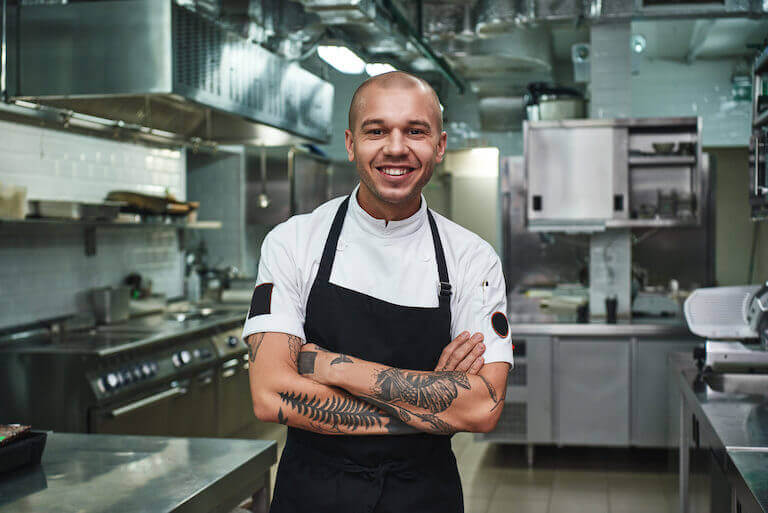
Job Duties: Hands-on Food Preparation vs. Managing a Kitchen
Do you see yourself as a hands-on chef or as a leader of chefs? Cooks in specialty positions are often the ones who do most of the cooking, whereas chefs in managerial positions may spend less time with a knife in hand.
Chefs often begin in hands-on food preparation positions. Some may want to stay there for a while or even for their entire careers. But if you want to become a chef, you do so by moving past these roles. You may not want to do that—and that’s OK. Career cooks are just as important to the success of the operation as a Chef in many respects.These are your true “workhorses” of the kitchen.
Chefs, on the other hand, are those who envision new menus and what food will look like when plated. These are the true artists of the culinary arts.
Others can’t wait to be promoted to managerial roles. You do not need to manage a kitchen to be a successful chef, but if that is where you’re headed, make sure to look for jobs that will give you leadership opportunities that support you in climbing to higher positions. And wherever you work, volunteer to help train and mentor new staff to gain experience in leadership activities.
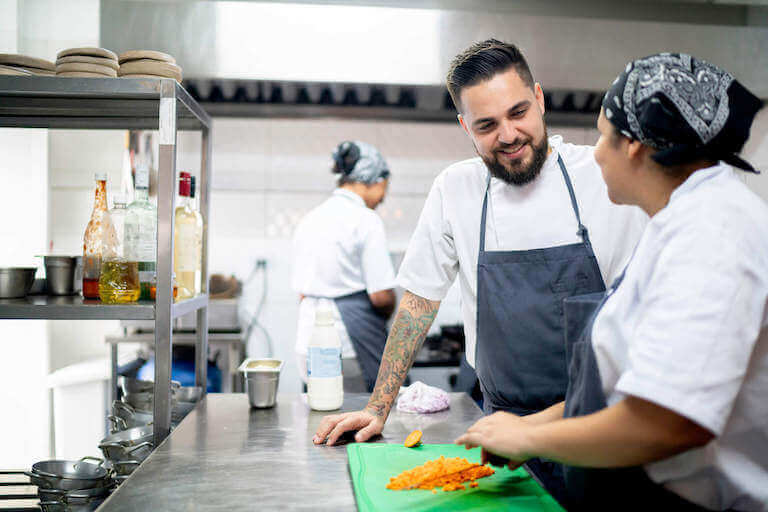
Creativity: Developing Menus, Plating Concepts, and More
Some chefs have a lot of creative freedom while others do not. As a general rule, the chefs at the top of the hierarchy are the ones helping to develop menus, brainstorm new plating presentations, and cultivate new techniques. Cooks lower on the hierarchy may be asked to execute directives without necessarily being asked for creative input—which can be a good thing in the early stages of career development, particularly if you’re working for an accomplished chef.
Every kitchen is different, but the amount of creative freedom you desire should be in the back of your mind during your career search.
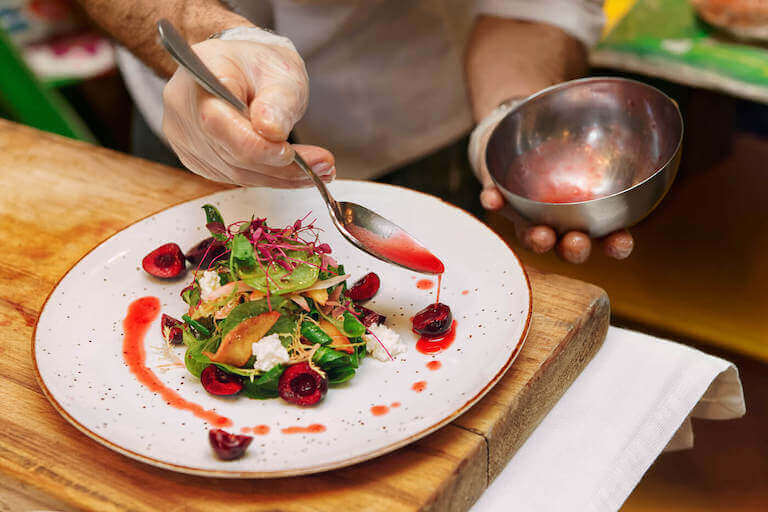
Sociability: Your Desired Amount of Guest and Team Interaction
Some people are more extraverted and crave socializing with others, whether those are guests or teammates. Others are more introverted, preferring to focus on creative tasks without a lot of interaction.
If you work in a busy restaurant kitchen, you aren’t likely going to be called on to answer guests’ questions or make sure that they’re receiving satisfactory service. But if you work as a chef in a smaller venue like a food truck or quick service location, providing great customer service may be part of your job description.
Likewise, culinary chefs are more likely to work together in teams to deliver meals to guests. Pastry chefs are more likely to work independently for long stretches of time—consider, for example, the work required to create a wedding cake.
Consider how much you’d like to interact with guests and teammates.
Scale: Cooking for Dozens, Thousands, or One Person
Would you prefer to make large meals for hundreds of people, as chefs do for catered events or in institutional cafeterias; cook for dining rooms with guests coming in and out, as chefs do in full service restaurants; or prepare small meals to suit the tastes of families or a single person, as a personal chef might?
Though these are, of course, not the only options when it comes to the scale of cooking different jobs require, they are important questions to ask yourself when looking for a job.

Cuisines: Specialization, Fusion, and More
Would you rather work in a kitchen that specializes in a single type of cuisine, or in a kitchen that often branches out and “mixes things up?” Neither option is less challenging, but some chefs enjoy cooking new things while others prefer the opportunity to master a few of the same dishes.
Learn more about each kitchen you apply to work in to find out how often it turns out new menu items.
Location: One Single Community or Move Around the Country?
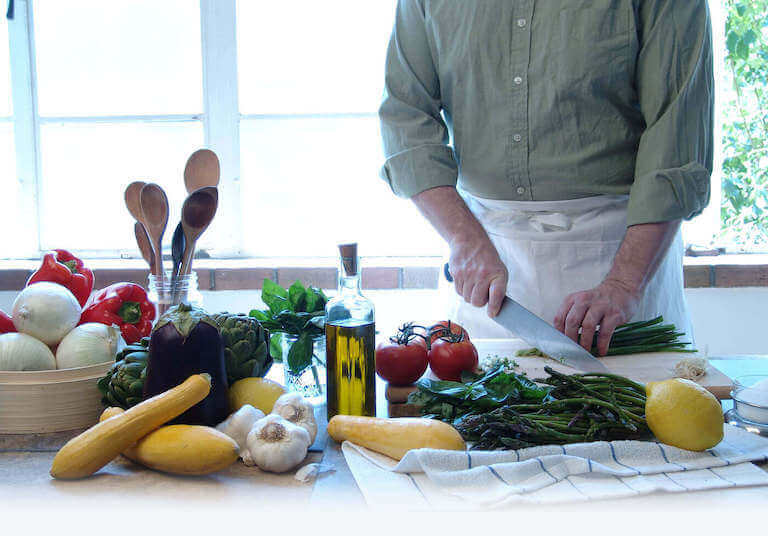
On the other hand, if you’re entrepreneurial and hope to own your own restaurant someday, you’ll probably need to be committed to a single community for years to come. Getting a restaurant off the ground takes a focused effort over a period of time, and that usually requires deep roots.
The 7 Segments of the Culinary Industry
Most people are surprised to learn how broad the opportunities are for people trained in the culinary and pastry arts. We’ve identified no fewer than 7 segments of the culinary industry, and more than 50 subsegments!
Understanding all of the various segments might open your eyes to jobs you’d never considered before—jobs that could be a perfect fit for someone with your preferences and skillset. It’s always good to have options, so do your research.
Here’s a partial list of the 7 segments of the culinary industry, and a few examples:
1. Lodging / Hospitality
The hospitality industry includes bed and breakfasts, hotels, resorts, spas, cruise ships, and more. Jobs in the hospitality industry tend to focus on the entirety of the guest experience, with food as only one of many important service items. Thus, training in Hospitality and Restaurant Operations Management can be helpful for securing these kinds of positions.
2. Catering
Catering includes work as a private or personal chef, full venue catering, and on- and off-premise catering. These can include weddings, bar and bat mitzvahs, birthdays, corporate gatherings, and dozens of other events. When people gather, they need to eat…would you like to serve them?
3. Restaurants
Restaurants are the most obvious landing spot for those who study the culinary and pastry arts. But keep in mind that inside of this category alone there is a huge amount of variety, including fine dining and upscale restaurants, fast casual restaurants, fast food, chain restaurants, restaurant groups, owner-operated restaurants, and ghost kitchens.
4. Retail Food
Retail food establishments include grocery stores, food trucks, bakeries, candy makers, ice cream and gelato shops, and more. In the retail food category, chefs are typically more customer-facing than in restaurants.
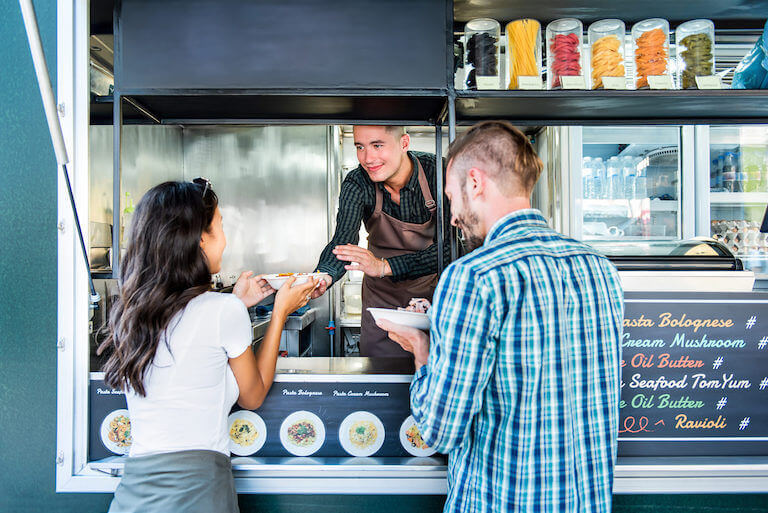
5. Leisure and Recreation
The leisure and recreation category includes theme parks, museums, clubs, stadiums, and similar venues. Job responsibilities could be anything from a single food service outlet within the larger venue to overseeing the entire venue’s food services. Expect to deal with influxes of crowds, logistics, and foods that can be consumed “on the go” as patrons enjoy the venue’s offerings.
6. Institutional and Commercial Dining
This category includes universities and colleges, healthcare, nursing homes and assisted living communities, employee cafeterias, fraternities and sororities, and more. Institutional and commercial dining establishments often require serving food at scale. They can also have extra dietary and regulatory considerations, for example nutrition requirements for schools and day care facilities.
7. Food Manufacturer / Wholesaler
Food manufacturers and wholesalers create foods that other operators sell. The category includes test kitchens, airlines, food distributors, food brokers, and even equipment manufacturers who create the machines for food production.
As this partial description demonstrates, the options in the food industry are wide and deep. Given the fact that people need to eat (at a minimum) three times every day—and that they’re often on the run or out and about in the world—means endless possibilities for those trained in the culinary arts.
If you’re curious about any of these segments, call on your network to see if anyone you know has experience in them and could shed light on the demands of a given position. You may even be able to interview people working in a segment that interests you or shadow them on the job.
If you attend culinary school, a Career Services representative will be assigned to you to help you navigate your options, assisting you with acquiring an industry externship to gain experience in an area that may be interesting to you.
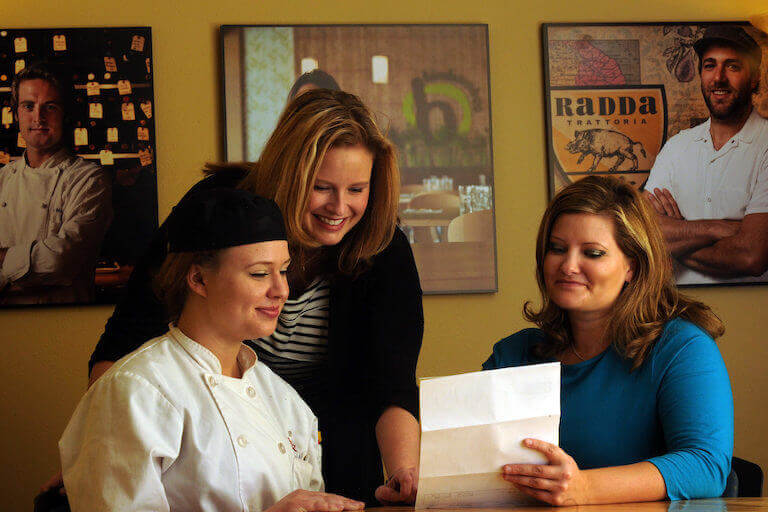
How to Find a Job as a Chef
Finding a job is usually a straight-forward process for anyone in any profession: you talk to your network and send out resumes. It’s finding the right job that can be challenging.
According to IBISWorld, there are an estimated 146,342 full-service restaurants in the United States as of 2023, a growth rate of 0.6% over 2022. Growth has been so strong, in fact, that it’s already completely erased the decrease in restaurants caused by the 2020 COVID-19 pandemic—and it doesn’t even include amusement and recreation venues or resorts and hotels.
In other words, it’s a great time to be training for a position as a chef. Still, the best jobs are always competitive, and you may need to work to set yourself apart from other qualified chefs.
Like any career, in the culinary world, networking is critical to job searching. Besides getting certifications and gaining as much hands-on, real-world experience as possible, growing your network is one of the best things you can do for yourself to build your career as a chef.
When you’re ready to look for a full-time job as a chef, use all of your connections to give yourself a better chance of finding open positions and getting offers.
Past Chef Instructors from culinary school and mentors from internships and jobs can use their insight into the industry and extensive connections to help you out when you’re looking for a job. They can help you get interviews and put in a good word for you, sometimes even giving you information about jobs that haven’t opened up yet but will soon.
In short, never take your network for granted. And the more flexible you can be on where you are willing to work and doing what, the better your chances of landing a great job.

Resources for Job-Seeking Chefs
Additional resources that you can use to identify career opportunities are those offered by your alma mater.
At most culinary schools and colleges, the Career Services department isn’t just there to help current students. Escoffier’s Career Services staff may also assist alumni with their job searches in the following ways:
- Posting about open houses and career fairs
- Resume and portfolio assistance
- Interview preparation
- Connecting grads with employers looking to hire graduates from a particular school (this is more common than you might think!)
While students are encouraged to take advantage of Career Services as much as possible while still in school, these services are available to alumni as well, and can make the transition from culinary school to employment much smoother. Additionally, Auguste Escoffier Global Solutions can offer job search assistance to students and graduates.
When it comes time to search for work, Auguste Escoffier Global Solutions’ EConnect can help to connect potential employees with the right work environment. This career marketplace is open to the public (not just Escoffier students/graduates) and includes job listings from a nationwide network of career-oriented employers like national hotel brands and exciting independent restaurants. Filter by industry segment, culinary specialty, and job type to search for the right match. An instant resume builder makes it easy to highlight your relevant experience, and you can often apply in one click!
Alumni groups like the Escoffier Alumni Association can be similarly useful to graduates. These communities can keep you in touch with people you graduate with, and people who graduated before you all around the country. You never know who may be hiring.
“What I think makes Escoffier the best culinary school for us to recruit from is the fact that their graduates are predictable. I know they have been trained properly, and I know they have a real passion for providing quality food for our customers.”*
Mary Ann Mathieu, Executive Recruiter for Sodexo
Working Your Way Up as a Chef: What to Expect
Becoming a leader in any field usually takes three things: education, experience, and drive. In other words, nobody is a “born leader,” and nobody (that we’re aware of, anyway!) instantly becomes an Executive Chef upon graduating from culinary school with no prior relevant experience.
Culinary schools like Escoffier can prepare aspiring chefs with hands-on experience, instruction, and mentoring, but most kitchens still require chefs to demonstrate their skills and leadership capabilities over time to earn promotions. For the most part, everyone has to work their way up in a kitchen to get to the top.
Most chefs start in entry-level positions overseen by managerial or station chefs. It is common practice for chefs to be promoted to higher positions and take on more responsibilities after a while of being successful in such a position, especially in kitchens that adhere to traditional hierarchies like the Brigade de Cuisine.
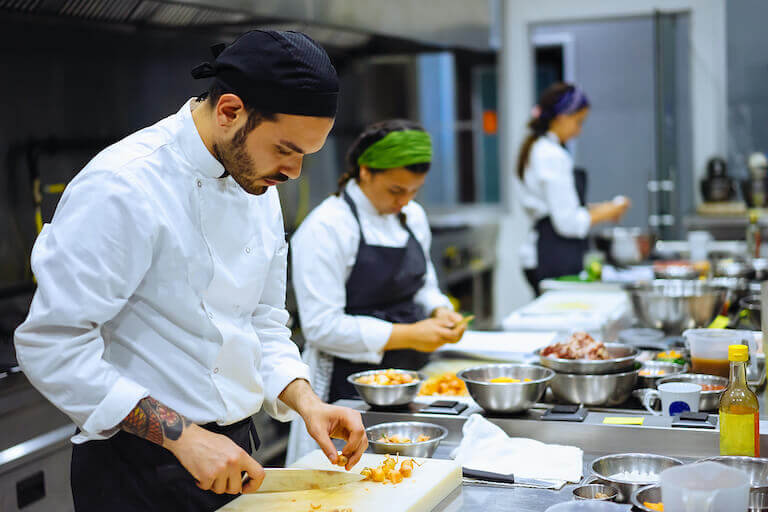
Kitchen Hierarchy and the Brigade de Cuisine
In nearly every professional kitchen, there is a “hierarchy” of roles called Brigade de Cuisine. This concept of kitchen structuring was developed by Auguste Escoffier, a French chef and leader in the culinary industry throughout the late 1800s and early 1900s. Today, his legacy lives on through his great grandson, Michel Escoffier, who has an Advisory Board role with Auguste Escoffier School of Culinary Arts.
From the top to the bottom, the Brigade de Cuisine looks like this:
- Executive Chef or Chef Executif
- Head Chef or Chef de Cuisine
- Sous Chef de Cuisine
- Station Chef or Chef de Partie (this is what Specialty Chefs are often called)
- Junior Chef or Commis Chef (apprentices)
- Kitchen Porter
- Dishwasher or Escuelerie
How These Roles Work Together
This traditional hierarchy can be best understood by thinking of it as a pyramid. At the bottom of the pyramid or hierarchy there are the dishwashers. There are many of these staff members, and they work to give guests a pleasant experience by ensuring a clean environment and timely service. They do not do any of the cooking but instead manage the customer service and sanitation needs of a restaurant, particularly its dining area. Without dishwashers, a restaurant would not be able to function.
Next there are the Kitchen Porters and Junior Chefs. Kitchen Porters may or may not assist with food preparation, as their services are typically requested on an as-needed basis. Above them are Station Chefs, who specialize in certain dishes, followed by the managerial chefs. As you move up the hierarchy, fewer chefs are needed for each role.
When you don’t work in a large kitchen with numerous chefs working together, you may see only a few of these jobs as there may not be a need for as many hands completing the same tasks.

Another position you may have heard of is the Sommelier. A Sommelier is not a chef but a wine expert, and thus technically a front of house position. But the sommelier must work closely with chefs to curate wine pairings for changing menus and specific guest tastes. A sommelier must have extensive knowledge of food in order to understand how different wines can complement particular dishes. They usually report to the General Manager. You will most often see sommeliers in fine dining settings.
How Mentors Will Help You Grow
One of the most important aspects to consider on the road to becoming a chef—and becoming a better chef—is mentorship. When you’re studying at an institution like Escoffier, your Chef Instructors mentor you using their cooking expertise and extensive real-world experience as you learn and practice new skills.
Once you’ve gotten hired as a chef in a professional kitchen, you will find more mentors. An obvious place to look for mentorship are the head chef and sous chefs. But don’t discount anyone with experience at any level. An experienced cook, for example, who absolutely loves their role and doesn’t have plans to become a chef, has much to teach, as do servers, peers, and others on the team.
An attitude of being able to learn and grow from all people and experiences is perhaps the greatest mentorship mindset of all. These mentors in the workforce can help you navigate a busy professional kitchen and climb your way up the ladder.
Always ask questions and study the chefs you admire. Read books written by other chefs. Most chefs are eager to share their knowledge with mentees, so that they can count on them for more tasks and responsibilities. As your chosen mentor or mentors share with you mistakes they’ve made and personal preferences they’ve come to have when cooking, you will find your own style and persona.
The people you’ve worked with and learned from are important throughout your career. Never stop searching for mentorship opportunities and keep your mentors in your network for as long as possible.
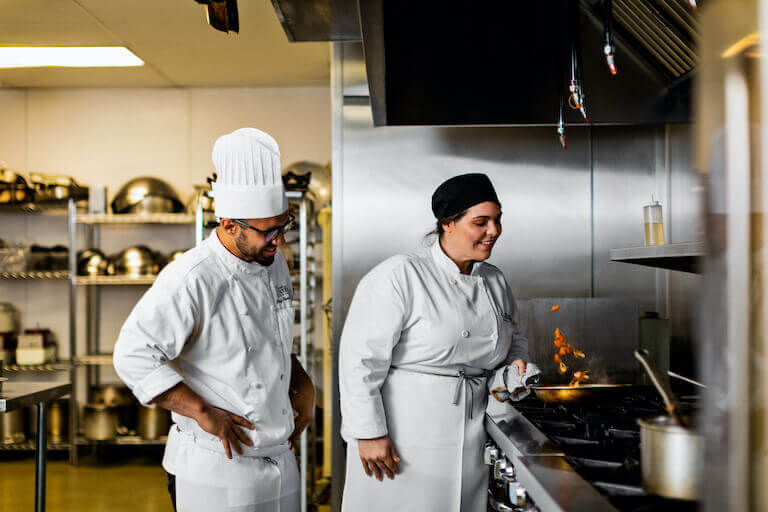
What Education is Required to Become a Chef?
A culinary education ending in a degree or diploma is not strictly necessary when you want to become a chef, but one of these credentials from an accredited culinary school, college, or institute can greatly improve your job prospects.
Omni Hotels & Resorts Executive Chef Josh Hasho explains why he is more likely to choose graduates from culinary school to fill job openings over other candidates, “If somebody goes to culinary school, it shows extra commitment and follow through…it’s a ‘gold star’ on their resume.”
Earning the title of “Chef” requires more than just a degree. You also need experience from externships and/or apprenticeships, training and mentoring, and whatever certifications you choose to back your skills up with. All of this should be thought of as a packaged deal with no piece being less important than the others on your resume.
Some people feel that working up through the ranks in professional kitchens is possible without a degree. While technically feasible, this approach proves difficult for many modern chefs. Even if you do manage to work your way up to a high-ranking position without a culinary degree, this title may not carry over to the next kitchen that hires you. A culinary diploma or degree is a set of credentials you can always take with you.
Even with on-the-job experience, hiring personnel or executive chefs could turn you away if you don’t have a degree or diploma in favor of other credentialed candidates who may have just as much experience as you. Sometimes a degree is considered to be the bare minimum.
Omni Hotels & Resorts Executive Chef Josh Hasho says culinary school is a gold star on a resume
In addition, having a formal education may be a part of your long-term goals, so why not join the esteemed ranks of culinary professionals with degrees or diplomas?
As is the case in most professions, the more you’ve invested into your career, the more you can get out of it. According to Indeed.com, one of the most common reasons to pursue a chef certification is to advance your career, since having a specialty or advanced credential could help you qualify for higher-level job opportunities.2
The Benefits of Going Back to School
Culinary students come from all walks of life. Some attend culinary school right out of high school. Others choose to work toward a culinary degree after working in a different industry, or even opening their own business. Younger and older students alike are welcome and represented in culinary school, and it’s not unusual to see experienced industry professionals among the ranks of students in class.
Years ago, formal education was more optional for chefs than it is now. Just about anyone could become a chef if they worked hard and learned through job shadowing and on-the-job training. But modern cooking—which often combines classical techniques with contemporary flavors and presentations—requires a robust new set of skills.
Some chefs feel that such skills are best taught through culinary education, which can be seen as supplementary to real-world experience.
“I always felt that it is important to have education on your side to reinforce what you get in the workforce. Learning in school and learning on the job are very much different from each other. Today classical cooking and learning the basics of true culinary arts skills is not taught in the career world, but in school you can learn that, and I feel that it is a core part of culinary arts that every chef should have the opportunity to learn.”*
Anthony Avasakdi, Escoffier Online Culinary Arts Graduate and Manager of Culinary & Operator Support Services at Ventura Foods
Some chefs go back to culinary school after working in the field for years to keep their skills sharp and stay informed about industry developments.
What Qualifications Do You Need to Be a Chef?
Different restaurants and venues set different requirements for prospective employees, but in general, you need to have practical work experience and certifications to prove your capabilities when applying for jobs as a chef.
Some hiring personnel require all applicants to have culinary degrees while others will accept a minimum of a high school diploma or equivalent. Some employers look for additional certifications, for example, from the American Culinary Federation, on top of a degree in candidates’ resumes.
Hiring managers always look to see how much real cooking experience you have, too. Candidates with more externships, apprenticeships, and/or relevant work experience are almost always preferred over others because they are likely to be more prepared for the demands and fast pace of professional kitchens.
What Are The Types of Culinary Degrees and Other Credentials You Can Get?
Many chefs and aspiring chefs pursue multiple avenues of education to reinforce their knowledge and back up their skills.
Culinary degrees and diplomas are just one way to do this, but there are other certifications that chefs can get when they want to invest in their growth. Here’s what you should know about the types of culinary degrees chefs can get and why accreditation matters.
Credentials From Non-Accredited Institutions
There are many chef credentials available that don’t come from an accredited culinary school or college. This may be because they are new, because they do not meet all of the standards set by the accrediting agency, or simply because an institution chooses not to submit their program for consideration.
You may decide to earn a credential from a non-accredited institution, but know that these may not always be regarded as highly as accredited institutions by hiring professionals.
Credentials from non-accredited institutions can sometimes be more affordable alternatives to certifications from accredited institutions. They can often serve to assist with one-off learning activities at a leisurely pace. But because they don’t pass through a strict peer-review process, they are not for everyone.
Credentials from Accredited Institutions
Culinary schools and colleges with accreditation must pass through a rigorous peer review by a federally-recognized accrediting agency. This ensures that the programs taught at different institutions meet a standard of academic merit established by others with expertise in the industry. Students attending accredited schools may also gain greater access to federally-backed financial aid such as loans, grants, and military programs, if they meet eligibility requirements.
One of the best credentials you can get as a chef is a culinary degree or diploma from an accredited culinary institute, school, or college. These require different commitments in terms of time and course requirements depending on the level of credential you pursue.
A diploma, for example, has fewer requirements than an associate or bachelor’s degree because they often don’t include general education requirements like science or math courses. Diploma programs are also less expensive than degree programs. With a lower time commitment and lower cost, diplomas are a great choice for students who wish to get to work as quickly as possible.
When you’re deciding on an accredited culinary institution, look into which accreditations the school has. For example, Escoffier’s Boulder, Colorado campus is accredited by the Accrediting Council for Continuing Education and Training (ACCET). ACCET is listed by the U.S. Department of Education as a nationally recognized accrediting agency. This information should not be hard to find.
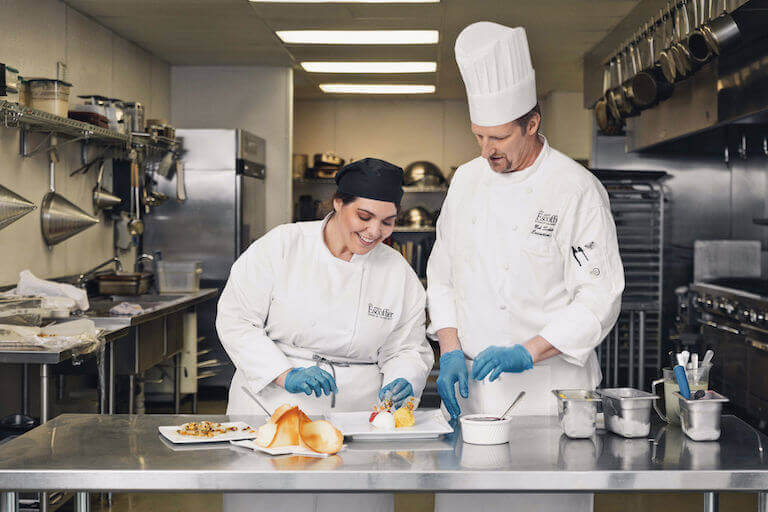
Bachelor’s Degrees
A bachelor’s degree is an undergraduate degree that typically requires about four years to complete. Bachelor’s Degrees are sometimes offered by institutions that offer multiple programs and curriculum areas other than culinary arts. Culinary institutes may offer them as well, but four-year degrees are not as common in culinary career schools.
Associate Degrees
Associate degrees are commonly offered by culinary institutes and sometimes available through community colleges as well. An associate program takes most students about two years to complete, but some are more flexible and can be completed more slowly or quickly.
Most culinary degrees have externship requirements that allow all students to learn from industry professionals in functional kitchens. The experiences afforded by an externship, which may last anywhere from 6 to 14 weeks, are endlessly rewarding.
Diplomas
A culinary diploma is not the same as a culinary degree. Diploma programs teach foundational skills and core competencies, while degree programs have these plus a general education requirement. Earning a diploma generally costs less than a degree, so many students choose this program to save money and get into the workforce more quickly. Another option is to begin with a diploma and then earn a degree.
Areas of Study for Chefs
What are the areas of study for those who wish to become a chef? It depends on the educational institution, but at Escoffier, students choose from options in the Pastry Arts, Culinary Arts, Culinary Arts with a plant-based focus, or Hospitality and Restaurant Operations Management.
Some culinary institutes offer more categories for even further specialization. When searching for culinary schools, it can help to look into the curriculum to ensure that you are able to study what you hope to study.
Culinary Arts

“Culinary” literally means, “of or related to the kitchen or cooking.” Thus, the culinary arts involve the creative process of designing experiences around food.
A chef with a Culinary Arts education has been trained in many foundational skills pertaining to food and may also have been trained in food production, cost management, ingredient sourcing, and other cooking and business areas of focus. A chef with this certification should feel prepared to fit into a kitchen or establishment.
Here’s an example of a class you might take when studying the culinary arts: Escoffier’s Culinary Arts programs include a Culinary Foundations course that explores both essential food safety and sanitation procedures, and how to identify and use different components like meats, vegetables and various types of ingredients. See more of the culinary school classes for Escoffier’s programs.
Pastry Arts

The main difference in the pastry arts is one of science and technical skill. Whereas the culinary arts tend to be more flexible in process, pastry arts creations require perfect measurements and great attention to details such as altitude and humidity.
In addition to pastries, pastry chefs prepare desserts, cakes, breads, and other sweet treats. A well-rounded Pastry Arts degree also includes entrepreneurship courses and management training, so that graduates are equipped with real-world skills that can be applied to a variety of career paths.
Someone with a Pastry Arts degree may go on to start their own business such as a bakery or chocolate shop, or they may choose to look for work in restaurants, hotels or food production companies. A kitchen may have a single pastry chef or a team of them, and pastry chefs may work alongside managerial chefs to plan menu items and pair sweet and savory creations.
Here’s an example of a class you might take when studying the pastry arts: Escoffier’s Pastry Arts programs feature an Artisan Baking or Foundations of Bread course with in-depth study of bread and dough production. This introductory course explores the role of yeast in bread products and affords many opportunities to practice a variety of breadmaking techniques. See more of the Baking & Pastry Arts classes at Escoffier.
Hospitality and Restaurant Operations Management

A chef with a Hospitality and Restaurant Operations Management credential can be better equipped to run their own business, whether that’s a restaurant or a different venue within the hospitality industry. In such a program, students consider how to provide exemplary customer service, how to optimize business operations to increase profit, how to develop a sound business plan, and more.
Many Pastry and Culinary Arts degree and diploma programs include entrepreneurship courses, but a Hospitality and Restaurant Operations Management program focuses on these more than on the specific culinary skills you get in the pastry and culinary programs.
Here’s an example of a class you might take when studying Hospitality and Restaurant Operations Management: An Escoffier Hospitality and Restaurant Operations Management degree includes a Building Your Own Business course that can teach students to identify business funding opportunities and recognize common pitfalls restaurants face. See more of the Hospitality and Restaurant Operations Management courses at Escoffier.
Why You Should Obtain Ongoing Industry Certifications
Credentials in the culinary industry are just as important as they are in any other industry. Chefs must master the many technical skills of cooking, the professional skills of delivering service and working in a team environment, and the business skills that are required to keep a restaurant profitable. Chefs with certifications could be giving themselves a leg up over their peers who do not do any kind of training, especially for more-desirable jobs.
According to Rosemary Batt, a Cornell University professor and author of a 2014 study on restaurant practices, formal training is “extremely important,” especially for those aspiring to work in fine- and casual fine-dining restaurants.3 Blatt’s study, in fact, found that the most substantial factor that affects wage levels in the industry is the customer segment that the restaurant serves.4
That said, remember that salaries and job opportunities depend on individual circumstances, which can vary greatly. So if you’re considering an investment in culinary school, carefully consider your own life situation so that you can make the decision that’s best for you.
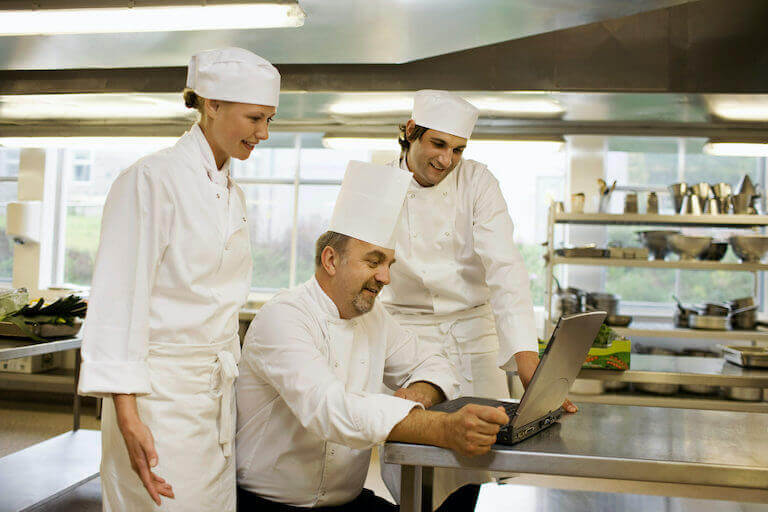
Opportunities for career advancement can be higher for certified chefs because they demonstrate motivation and qualification. If given the choice between certified and uncertified chefs, many managers may choose the certified candidate without hesitation.
The culinary industry is always changing, and the value of continued education cannot be understated. When a chef continues investing time and resources into developing their career, this shows that they are passionate about what they do and willing to go the extra mile to be the best.
Michael Allen, an Escoffier Online Culinary Arts graduate, said that going back to school or taking additional classes is also a way to ensure that your culinary certifications are up to date: “I chose to attend Escoffier at this stage in my career as a way to keep me relevant in the industry and up-to-date with certification. I go to any length to be the best in my career that I may be.”
American Culinary Federation Certification: What It Means and How to Get It
The American Culinary Federation (ACF) is the largest professional organization for Chefs in the United States, with origins dating back to 1929. It is the leading provider of certification for Chefs, offering 21 different certification levels based on the candidate’s demonstrated work experience and both formal and continuing education. ACF certifications are well-recognized throughout the culinary community and are not affiliated with any one institution. Anyone is eligible to try to earn ACF certifications as long as they meet the experience and education requirements.
ACF certifications are available for Sous Chefs, Chef de Cuisines, Executive Chefs, Master Chef, Personal Chefs, Pastry Chefs, and more. A minimum of a high school diploma or equivalent is required for all certifications. Higher-level education may also be required, either from an accredited culinary school, or in the form of continuing education approved by the ACF, plus required coursework relative to the specific certification. Examples include sanitation, nutrition, management and/or wine & beverage. All certifications include practical and written examinations as an assessment of the candidate’s hands-on skill set and technical knowledge. Practical exams are evaluated by already certified ACF Chefs as part of a peer review process designed to encourage advancement within the industry.
Some ACF certifications are only available to chefs with experience, while others are offered to beginners as well. For example, no field experience is required to obtain a Certified Fundamentals Cook certification, but a minimum of two years’ experience supervising in a professional kitchen is required for the Certified Sous Chef certification.
Learn more about the American Culinary Federation.
Certified Master Bakers and Certified Master Pastry Chefs®
Those with a passion for baking may decide to put their skills to the test and become a Certified Master Baker. This certification, granted by the Retailer’s Bakery Association, requires experienced chefs to complete 60 hours of coursework and pass a two-day exam proctored by a panel of scrutinizing judges. Escoffier Online Pastry Chef Instructor Master Baker Collette Christian saw this challenging certification as just another way to set herself apart from other chefs and prove her worth. Some day, you may be similarly compelled to get certifications.
Becoming a Certified Master Pastry Chef® (CMPC®) is the highest level of pastry chef certification that one can receive. Escoffier Certified Master Pastry Chef® Frank Volkommer is one of only eleven CMPCs® in the entire country. To earn it, Chef Frank had to complete a grueling 10-day exam by the American Culinary Federation (ACF).
So You Want to Become a Chef…Now What?
Whether you began your culinary career years ago, or you’ve only just begun, you can take action now to meet your career goals.
There is no “correct” way to become a chef, but there are several possible ways to grow your skills and set yourself apart from others. Will you get certified? Find a mentor? Network? Go to school? No matter what you do, give it your all, and you will be on your way to achieving success as a chef.
If receiving a well-rounded culinary education is the next step for your career, contact us for more information about our online and in-person degree and diploma programs.
For more advice about starting a culinary or pastry career, read these articles:
- Should You Go to Culinary School? A Guide for Deciding
- How to Become a Pastry Chef
- What Are the Types of Culinary Degrees and Diplomas
This article was originally published on August 12, 2021, but has since been updated.
*Information may not reflect every student’s experience. Results and outcomes may be based on several factors, such as geographical region or previous experience.
1,3 Culinary Schools Speed the Rise of Hopeful Chefs, New York Times
2 10 Chef Certifications to Advance Your Culinary Career, Indeed.com
4 A National Study of Human Resource Practices, Turnover, and Customer Service in the Restaurant Industry
For more information about our completion rates and other important consumer information, please visit: www.escoffier.edu/consumer-information/

 “We’re able to take people and give them the experience that they need in a real-world work setting. I think having the practical side mixed with the formal education is a chance to be successful. Tying all those pieces together from a passion perspective into an educational perspective, I think that’s really where the secret sauce lies.“*
“We’re able to take people and give them the experience that they need in a real-world work setting. I think having the practical side mixed with the formal education is a chance to be successful. Tying all those pieces together from a passion perspective into an educational perspective, I think that’s really where the secret sauce lies.“*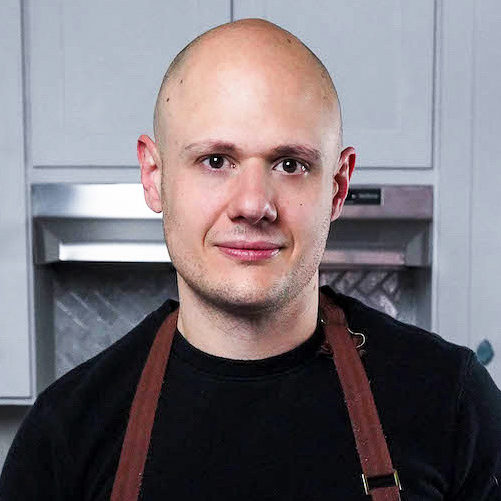 “I’ve done everything from helping small mom-and-pop cafes get off the ground, kitchen designs, menu design, cross-utilization training, culinary training, and we’ve gone all the way up to product commercialization. For example, several products that are currently on the shelves in grocery stores and markets are ones that I’ve helped consult to get off the ground.”*
“I’ve done everything from helping small mom-and-pop cafes get off the ground, kitchen designs, menu design, cross-utilization training, culinary training, and we’ve gone all the way up to product commercialization. For example, several products that are currently on the shelves in grocery stores and markets are ones that I’ve helped consult to get off the ground.”* “What I think makes Escoffier the best culinary school for us to recruit from is the fact that their graduates are predictable. I know they have been trained properly, and I know they have a real passion for providing quality food for our customers.”*
“What I think makes Escoffier the best culinary school for us to recruit from is the fact that their graduates are predictable. I know they have been trained properly, and I know they have a real passion for providing quality food for our customers.”*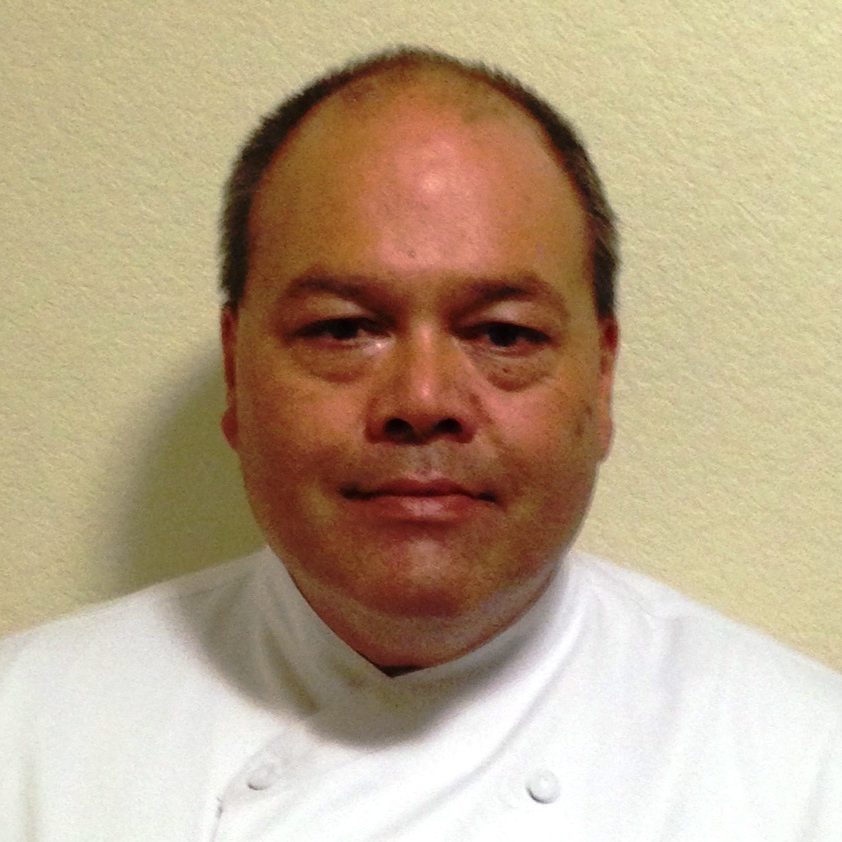 “I always felt that it is important to have education on your side to reinforce what you get in the workforce. Learning in school and learning on the job are very much different from each other. Today classical cooking and learning the basics of true culinary arts skills is not taught in the career world, but in school you can learn that, and I feel that it is a core part of culinary arts that every chef should have the opportunity to learn.”*
“I always felt that it is important to have education on your side to reinforce what you get in the workforce. Learning in school and learning on the job are very much different from each other. Today classical cooking and learning the basics of true culinary arts skills is not taught in the career world, but in school you can learn that, and I feel that it is a core part of culinary arts that every chef should have the opportunity to learn.”*